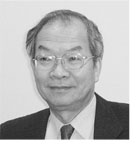| Tadao Saito |
 Dr. Tadao Saito graduated in electronics from the University of Tokyo in 1963 and gained his Ph.D. in electronics at the same institution in 1968. Remaining with the University of Tokyo, he was appointed as a lecturer in 1968, an associate professor in 1969 and a professor in 1986. He is now a Professor Emeritus of the university.
Dr. Tadao Saito graduated in electronics from the University of Tokyo in 1963 and gained his Ph.D. in electronics at the same institution in 1968. Remaining with the University of Tokyo, he was appointed as a lecturer in 1968, an associate professor in 1969 and a professor in 1986. He is now a Professor Emeritus of the university.During his tenure, he taught and studied in the fields of communications technology and computer networks. He also worked for improvement of the university’s information services as Director of the Educational Computer Center, Director of the Large Scale Computer Center and Director of the IT Center.
After retiring from the University of Tokyo in 2001, he joined the Toyota InfoTechnology Center, and with this began a period of outstanding study achievements and a career in industry as CTO of Toyota ITC.
He worked on a variety of key subjects, including basic information theory, digital switching, network synchronization, high-capacity packet switching, circuit assignment for wireless communication, protocol engineering, hub type local area networking, and computer networks. One of his notable achievements was a time switch using capacity-based memory for digital switching. This technology is essential for digitalizing switching machines and became the world standard in this field. This capacity-based memory circuit also became the basis of CMOS memory.
For seven years, he served as science advisor to the Ministry of Education. He also contributed to other ministries including the Ministry of Education, Ministry of Industry, Ministry of Land, Ministry of Posts and Telecommunications, Ministry of Internal Affairs and Communications and the Cabinet Office as a member of various government councils. From 1998 through 2002 he was chairman of the Telecommunications Business Committee of the Telecommunications Council under the Ministry of Internal Affairs and Communications and he contributed to establishment of communication business principles for the Internet age. Included in his contribution are rules for ADSL deployment, nationwide broadband project, 10 digit number for mobile communication, inter-carrier interconnection rules, selection of long-line carrier and number portability. He also devised a systems standard for the computer systems of local governments to reduce the cost of developments and to adapt these systems for e-government services. His contribution to the Tokyo Metropolitan Area Police was designing the basic architecture of the Tokyo road traffic signal control system for 7,000 intersections, in 1970. That basic architecture is still operating in Tokyo.
He has also been the Japanese General Assembly representative to the International Federation of Information Processing (IFIP) since 2005, after having contributed to IFIP as the Japanese representative of Technical Committee 6 (Communication Systems) since 1993.
For these activities, he has received an Inada Prize, two awards for papers, an achievement prize, a fellow nomination, and an honorary member nomination from IEICE. He has also received an award for a paper from the Institute of Electrical Engineering of Japan, two awards from the Minister of Posts and Telecommunications, an award from the of Minister of Internal Affairs and Communications, an Ichimura Prize, and a Maejima Prize. IEEE nominated him for a life fellowship.
At IEICE, he worked in the handbook committee over a long period, and he published eight handbooks. He was vice chairman of IEICE in 2001-2003 and, in that position, he established regional representative meetings for the Asian Region and strengthened the international activities of IEICE. He was president of IEICE in 2005-2006, during which period he changed IEICE transactions from paper publication to online journals and provided online access to Japanese and English transactions for all members of IEICE.
His contributions to information and communications technology and to IEICE are significant, and they richly deserve to be recognized with an IEICE merit award.